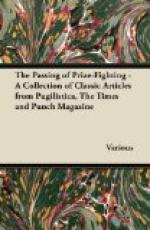“You, my Lord, who are disinterested in this matter, tell us what you think of it.”
“I think,” replied the Baron, with admirable sangfroid, “his Highness the DOGE would have felt better if the ice had been warmer, and the poker cooler.”
Everybody laughed. The DOGE and Baron MUNCHAUSEN shook hands, and the dinner ended gaily.
* * * * *
RYMOND, writing lui-meme with too infrequent pen, makes pathetic reference to the death of “one of the largest and best known purveyors of Rhine wine, with whom I have had business relations and personal intercourse for nearly thirty years.” There is, we need hardly say, no basis for the insinuation thrown out by HENED that the business relations referred to were of the commission order sometimes established between purveyors of Rhine and other wines and gentlemen who have a wide circle of friends.
* * * * *
THEORY AND PRACTICE.
SCENE—Interior
of a First-class Railway Carriage.
Theoretical Passenger and
Practical Passenger discussing the
“Unreadiness of England."
Theoretical Passenger (at the conclusion of a long account of the national shortcomings). Yes, my dear Sir, France has only to declare war to-morrow, and we are completely ruined! We cease to exist as a nation!
Practical Passenger (with a smile). But hasn’t this been said about us—by ourselves—for any number of years?
Theo. Pas. Doubtless, but that does not make it the less true.
Prac. Pas. Possibly; still, it is encouraging to find that we do exist in spite of the “temptation to belong to other nations.”
Theo. Pas. (annoyed). Ah! you treat the matter with levity; but I assure you it is a most serious thing! How would you like to be bombarded?
Prac. Pas. Not at all. The more especially as it would be a great expense to the enemy.
Theo. Pas. (with dignified resentment). I see you consider the subject a proper topic for raillery! It is a very fine day!
Prac. Pas. (in a conciliatory tone). No, no, I can assure you I am deeply interested. But how about our Fleet—surely that should protect us?
Theo. Pas. You must be very much behind the age to say so. Our Fleet is practically valueless. It is perfectly easy to invade us at a dozen places. If the French went to Ireland (as they did in the last century), the conquest of England would be assured. They would (with the assistance of a friendly peasantry), get their supplies and make good their footing.




